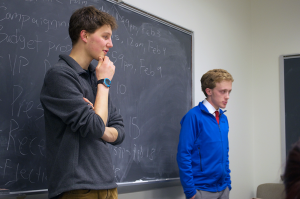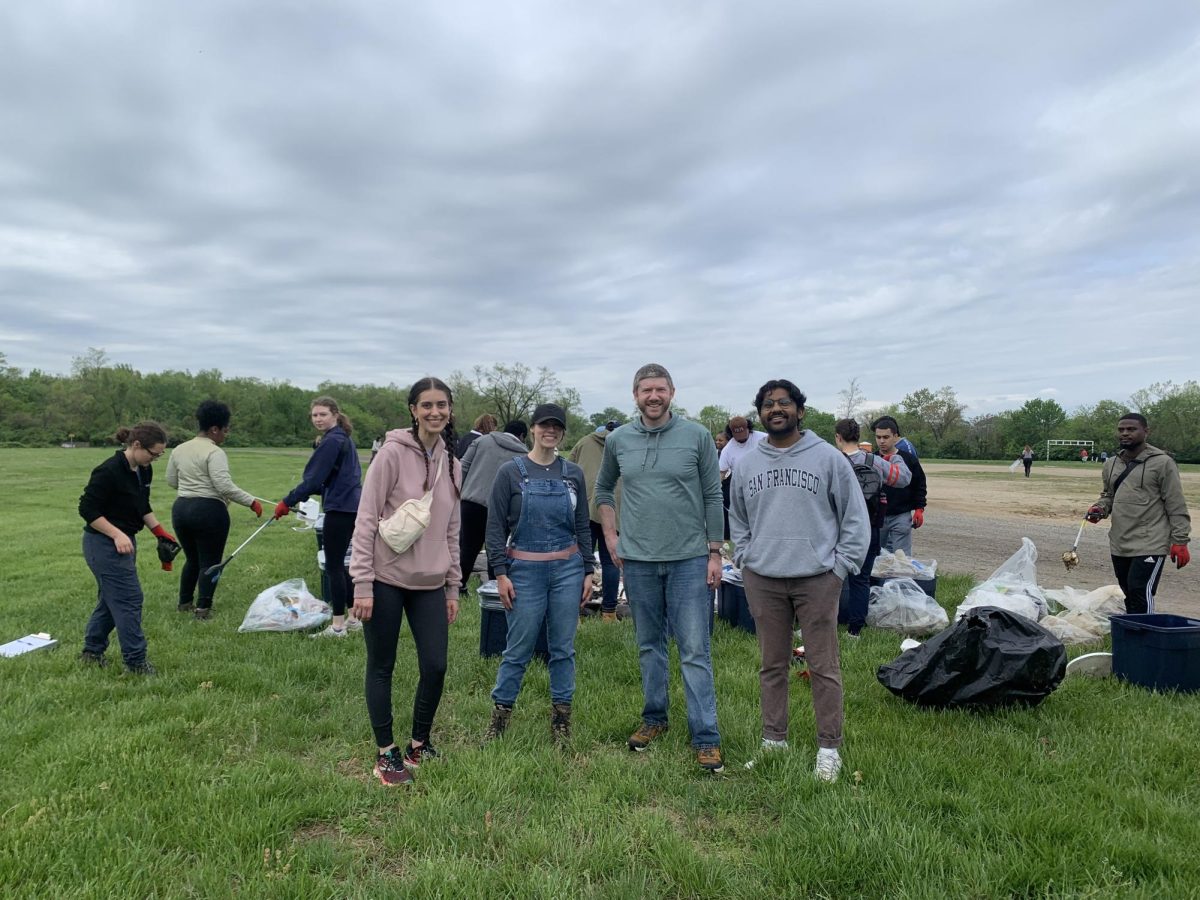
A combined 17 students, excluding campus media, attended the information sessions on campaigning for executive office held by the Georgetown University Student Association Election Commission, suggesting a maximum of eight presidential and vice presidential pairings for this year’s election season.
Each candidate seeking to run in the election is required to attend one of two meetings.
Candidates are not allowed to begin campaign activity until the official campaign period begins Thursday.
Five eligible students attended the first session on Jan. 29, including Alex Bobroske (SFS ’17), Tim Yim (SFS ’17) and GUSA Deputy Chief of Staff Chris Fisk (COL ’17). Bobroske and Yim worked previously as staffers on last year’s GUSA campaigns for the Abbey McNaughton (COL ’16) and Will Simons (COL ’16) ticket and the Chris Wadibia (COL ’16) and Meredith Cheney (COL ’16) ticket, respectively.
Twelve students attended the second meeting Tuesday, including GUSA senate Speaker Enushe Khan (MSB ’17), Chris Grocki (SFS ’17), Joe Picozzi (COL ’17), A.J. Serlemitsos (COL ’17) and Tony Pezzullo (MSB ’17).
Sources close to the candidates confirm the likely presidential and vice presidential pairings of Khan and Fisk, as well as Pezzullo and Serlemitsos.
There will be two debates for vice presidential and presidential candidates on Feb. 10 and Feb. 15, respectively. The election will be held digitally Feb. 18.
In an effort to minimize the election from interfering with residential life, the Election Commission has adopted new campaign rules regarding flyering and door-knocking. Campaigners may only knock on doors in pairs of two, while wearing identification of their affiliated campaign and not after quiet hours.-
Additionally, flyers may not be posted or slid under doors without permission from residents.
GUSA Election Commissioner Alden Fletcher (SFS ’17) said the new policies were created to make the election easier for students.
“These are really policies that are designed to protect the free time and space of the student body,” Fletcher said. “To me, these don’t seem like constraints on campaigning and really just things to make sure that the students aren’t perturbed by the occurrence of an election on campus. To me, these seem common sense.”
Campaign budgets will be restricted to 300 dollars per ticket and candidates may seek financial assistance with demonstrated need from the Center for Student Engagement. The Election Commission emphasized that spending money on a campaign is not necessary for success, citing last year’s winning ticket’s declared spending of 60 dollars.
Before tonight’s meeting, it appeared there was a significant chance the election would see few candidates or even be a one-ticket race.
Current GUSA Vice President Connor Rohan (COL ’16) said he does not think low participation can be attributed to any single factor.
“I think this year might have just been a freak event because you had the interest and then for one reason or another from multiple potential tickets it just didn’t work out,” Rohan said.
GUSA Election Commissioner Grady Willard (SFS ’18) said after tonight’s meeting that the chances of a one-ticket race are unlikely, but spoke about the protocol for such an event.
“I think after tonight the chance of there being only one ticket is extremely low,” Willard said. “If there was one ticket … there would be some kind of an opportunity for campus media, students and the Election Commission to ask the candidate questions. What form it would take, I don’t know at this point.”
Platforms will likely include positions on the appropriate policies in response to results from the Sexual Assault and Misconduct Climate Survey, the 2018 Campus Plan and campus dining, as Georgetown’s contract with its auxiliary services contractor Aramark expires this year.
Both Luther and Rohan discussed the experience of campaigning and working with GUSA as a newcomer at the information session.
“Campaigning is a lot of fun,” Luther said. “You get to meet a lot of people. You get to really talk to people about what they care about, spread your message and your wings.”
Rohan also offered some advice to potential candidates.
“If you take yourselves too seriously, I don’t want you to run,” Rohan said. “Have fun. Be yourselves. Don’t follow one track. There’s a million ways to do it. Some of them work, some of them don’t. Don’t offend anybody. You’re going to have to walk on some eggshells once in a while. I have faith in every single person here to execute this job properly.”
Rohan recounted the advice given to him by former GUSA President Trevor Tezel (SFS ’15) the night he and Luther were elected.
“Anybody can do it,” he said.





















SU • Feb 3, 2016 at 11:21 am
As reasonable as I think these new doorknocking restrictions are, I sincerely hope they were adopted into the by-laws by the Senate. The election commission does not have the ability to adopt new rules unilaterally, and for good reason: its doing so led to disaster in the 2008 GUSA election.
The relevant sections of the by-laws are 13.06 (“No other restrictions other than those stated here shall apply to campaigning.”) and 14.03 (“The Election Commission must run the Senate and Presidential elections according to the election by-laws established by the Senate. The Election Commission does not have the power to make any new rules for election or modify election regulation.”)